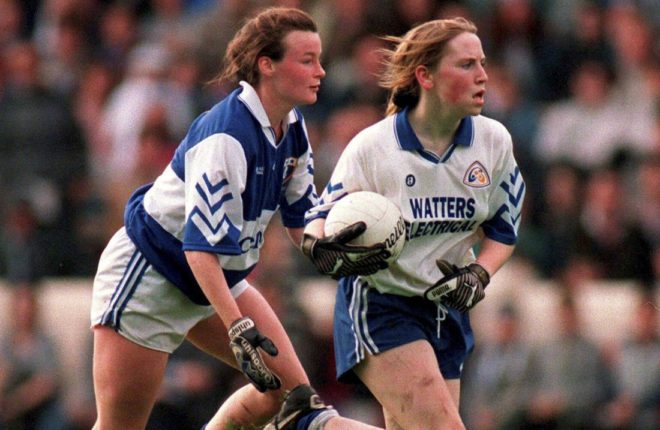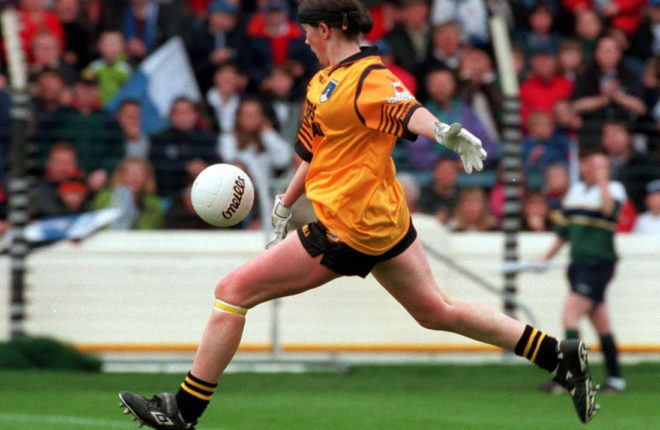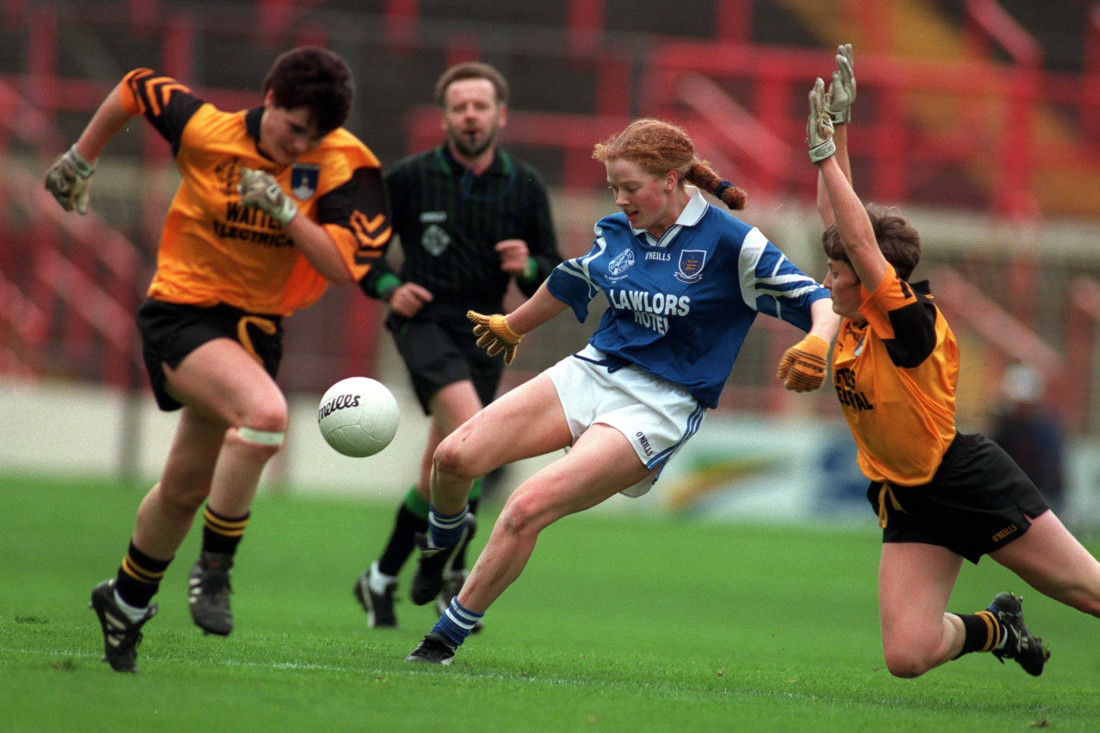It’s been 25 years since Monaghan ladies completed back to back All-Ireland Senior Ladies titles. Brendan McAnespie looks back on some of the memories.
By Michael McMullan
JUST six years after Monaghan dipped its toes into the world of Ladies football, they were back to back All-Ireland senior champions.
Winning the 1996 title was their breakthrough year, but beating a dominant Waterford 12 months later, to keep both hands on the Brendan Martin Cup, was the icing on the cake.
Maurice Kindlon and Philip Kelly took the infant steps, coaching a Magheracloone underage group in the summer of 1990.
Momentum raised its head. Less than two weeks into the new year, 17 people oversaw a meeting that founded the club. By the time Monaghan Harps and Aghabog followed in their footsteps at a March meeting, the Monaghan club scene was born.
Within a month Kelly and Kindlon were selectors under manager Paddy Flood for Monaghan’s first senior game, a home defeat when two Jenny Greenan points and Marie Gargan’s goal weren’t enough to halt Longford.
By the end of 1991 ten clubs were affiliated, but the county senior team were on the wrong end of 28-point drubbing at the hands of Clare in the All-Ireland quarter-final.
But Monaghan were fast learners. The curtain came down on the 1992 season with Monaghan holding both the Ulster and All-Ireland junior titles.
Their 2-8 to 2-6 win over London, thanks to a late penalty from Mairead Kelly, was the beginning of their regular trips to Croke Park on All-Ireland final Sunday.
“The county team built from a very competitive club scene in Monaghan at that time,” McAnespie said of the early Farney progress.
A native of Scotstown, she played on the boys’ team until u-12 before joining Monaghan Harps. After getting married and transferring to Emyvale in 1995, she’d win an All-Ireland club in 2008, lining out alongside her daughters.
When they lifted the 2019 All-Ireland Sevens title, all five daughters joined her on the winning team.
“There were a lot of very, very competitive clubs so the county team started to get stronger,” she said of the rapid progress.
“We only set up in the early nineties so it took a few years and Waterford would’ve been the Cork of the 2000s back then.”
Kerry had won nine-titles in a row, followed by their last success in 1993, sandwiched in the middle of a possible Waterford three-in-row.
“We met them in the 1994 final and ran them very close,” McAnespie said.
In an edition of Laochra Gael depicting McAnepsie’s career, Deise boss Michael Ryan said they were “the fright of their lives” in that final.
After falling pregnant with their son Ryan, a current Monaghan senior player, McAnespie missed the 1995 campaign that saw Monaghan “well beaten” by Waterford in the final.
They were new to the senior ranks, but there was progress battling its way from under the darkness of defeat.
“In those early days, we were travelling the county and getting beat,” McAnespie said.
“We were throwing a team together basically…of girls that didn’t know each other. I remember getting on the bus at five o’clock in the morning, away to play a game.”
As the years passed, the team began to form. Manager Des Patton, with selectors Micheál McKeown and Michael Morgan, upped the ante at the start of the 1996 season.
When the All-Ireland series arrived, Monaghan took Waterford all the way to their own backyard in Aghabog for the semi-final.
“Michael Ryan in an interview afterwards was laughing about Monaghan taking them to Aghabog,” McAnespie recalled.
When the Monaghan team took the field, Ryan remembers them running through the Waterford warm-up. It was a signal of intent. The home side refused to be denied and recorded a win to set up a Croke Park meeting with a Laois team powered by Sue Ramsbottom.
The new-look management team brought a “more professional” approach to preparation.
Foot and water intake were now important. Little was left to chance and it wasn’t a case of going out and playing for the sake of it. There was always a purpose.
“We could see the girls starting to gel together as a formidable team,” McAnespie added.
Monaghan looked to have the game in the bag until a foul on Ramsbottom handed Lulu Carroll a close-range free.
“I can still see it,” said McAnespie, who was positioned on the goal line.
”A lot of us aren’t very tall. Lulu, lord have mercy on her, took the free kick. There were five of us on the line, but the ball still went into the net.
“In the dressing room, you thought you had lost the game. When we came home, it took a few days to get back into it again and you realise you haven’t lost it,” said McAnespie who was switched to negate the influence of Laois star Linda Brennan in the replay.

OFF THE LAOIS…Jenny Greenan carries the fight against Laois in the 1996 final
It worked a treat as an re-energised Monaghan eased to a nine-point victory and a first ever All-Ireland senior title.
“There was a lot of celebration, not just with the team, but the supporters in the county got momentum as well,” McAnespie said of the ’96 success.
“For Monaghan to win an All-Ireland title, and it doesn’t happen that often, it was special. To come in through all the different clubs, driving around the county, all the celebrations would’ve been a big thing.”
The junior win in 1992 kick-started interest across the county and a dramatic rise to becoming senior champions elevated it even further.
The rivalry between Monaghan and Waterford attracted growing audiences and inspired young players across the country.
It was a shop window everybody wanted to be standing in and when the finals were televised live for the first time in 1998 the bar was raised even further.
Beating Waterford in Croke Park was the burning desire in the Monaghan camp as their 1997 season arrived over the horizon.
In a change of management, Michael Morgan stepped up to take over, with Cathal Hand and Paul Swift coming on board as selectors.
“You could see that ‘96 definitely lit a flame in the county,” McAnespie said. “The support increased massively going into ’97 that’s when the crowds really started to rise in Croke Park to the levels they are at now.”
With the league title retained, Mayo stood in Monaghan’s way of a championship return to Croke Park.
Cora Staunton was putting on an exhibition and even when Monaghan pulled into the lead, Mayo were back on level terms by half-time. It took a brace of goals from Diane Dempsey to see Monaghan into another decider against their Deise rivals.
In the six weeks before the final, Brenda discovered she would be 14 weeks pregnant with Eimear by the time of the final.
“You were trying to manage hiding it and preparing for the football at the same time,” she said of the week by week approach.
“She (Eimear) was running around in Croke Park unbeknownst to her,” McAnespie laughed.
The bigger picture was the magnitude of the challenge and occasion facing Monaghan their All-Ireland title lay on the line.
“Even though we had beaten Waterford (in 1996), it was a small, tight pitch that probably suited Monaghan,” McAnespie admits of their semi-final victory in Aghabog.
A rematch in Croke Park would unleash a whole new set of questions, but when Edel Byrne beat the Waterford goalkeeper to flick a probing ball to the net, Monaghan were in business.

FULL FOCUS…Niamh Kindlon won an All-Ireland medal in her first season of senior football
It got even better when 16-year-old Niamh Kindlon kicked a rasper to the top corner. Just six summers after her father Maurice got the ball rolling with his coaching sessions in Magheracloone, she was an All-Ireland senior winner in her first season.
This was their landmark Sunday, but Waterford were intent on tearing up the script. Six points in a nine-minute period had Michael Ryan’s side back in the mix.
In the second half, McAnespie put on a display for the ages. From her centre back berth she was like a magnet to the ball. Her positioning helped mop up Waterford’s kicking game and her organisational skills navigated Monaghan’s midfield to sit deeper.
With players from both sides dropping with cramp, nearly 12 minutes of injury time accrued and Waterford were refusing to go away.
This was the moment Monaghan’s ramped up preparations were geared towards. All the hard yards and tests of mental strength took them to the coal face.
With half of the stoppage time gone, Jenny Greenan found an ounce of energy to get forward to level matters once again.
The ball was like a gold bar. Precious wasn’t the word, but it was Monaghan who found a way to glory. A long delivery into the Nally Stand corner was snapped up by Edel Byrne who curled between the posts to send their fans into raptures again.
There was a premature pitch invasion before fans were corralled back beyond the sidelines and Byrne added an insurance point.
As Angela Larkin ferried another ball through midfield, the sound of the hooter was music to Monaghan ears. They were champions again.
“This was the big one,” McAnespie echoed. “Yes, ’96 was a big, but it was the ‘97 one that stands out because it was Waterford in Croke Park.”
It had taken time for Monaghan to grow from the early shoots in 1991 to etch their name into the history books.
“We had a very strong team put together from some very strong clubs,” McAnespie said of the most important factor in a spiralling level of interest that helped their growth.
“Winning the junior All-Ireland in 1992…it was such a big thing for us and then after that it was getting all the best players out from all the different clubs.”
On their senior journey, the hurt of losing two finals, 1994 and 1995, also helped sharpen the focus.
“It can also take a few years to get to know the positions everybody plays best in. I know myself; I was switching around and not knowing really where you were playing,” McAnespie added.
“It is just getting the best positions that everybody can play in and it takes a while to do that for girls to start playing together.
“It was only very new in Monaghan, to be fair, so you mightn’t have had all the players available to you for those (early) years.”
The level Waterford reached also helped raise the standards. McAnespie compares them to Kilkenny hurlers and how Eamonn Ryan built the Cork Ladies’ dynasty.
“Waterford were very strong. They had a very strong club, Ballymacarbry; they made up most of that county team” she said, billing them as “unbeatable”.
Ten All-Ireland Club titles in 12 years gave Waterford the footing to build on.
“Waterford were a very strong team and Michael Ryan was like the Brian Cody or the Mickey Harte in management in hurling and football,” hailed McAnespie of their rivals.
“He was a manager you had the highest respect for and he got them to that level. They were like the Dublin team now, a team you want to rise up to and beat.”
It forced Monaghan to equal the Deise levels of preparation and beyond it.
“It was a massive dimension to add to the game. I suppose it made the difference, in 1996 and 1997 we gelled together and we were lucky,” she said.
It was Monaghan and Waterford once again in the 1998 final with Monaghan going for a third successive title.
Edel Byrne kicked a point to force a replay despite Monaghan coasting to an early 1-3 to 0-1 lead.
It was Waterford who were out of the blocks early when the sides met again, leading 1-8 to 0-5 by half-time.
Monaghan refused to throw in the towel, but as goal chances came off the goalkeeper, crossbar and post on different occasions, it was Waterford who held on for victory.
“The second game has those memories of goals going in that I shouldn’t have let in,” McAnespie said of her return as goalkeeper that season.
“It would’ve been lovely to have won the three in a row,” she said.
Monaghan have lost four finals in the meantime, with their one-point defeat at the hands of the Cork juggernaut in the 2013 decider the closest they’ve come since, with Brenda’s twin daughters Aoife and Ciara on the Farney side.
McAnespie counts herself fortunate to have two All-Ireland senior medals and would swap one of them with her girls, acknowledging the level of efforts the Monaghan teams have expended in search of a third senior All-Ireland.
“They were touching at the door for a right few years, but that’s the way football goes,” she said.
But Brenda cherishes all the memories.
“I was talking to Edel (Byrne) the other day and we were laughing about going into that final as 1997,” she said.
“She was only 16 and she couldn’t get the nerves. As an older player, the minute you saw Croke Park, your legs nearly went from you.”
The Monaghan football family became an intricate part of those magical years.
“I have so many friendships through it,” McAnespie said. “I came from a small family and only had one brother.
“When we had our own kids, I ended up meeting the McNally girls through football and two of them ended up as godmother for two of my kids.
“Mickey Morgan, who was the manager, his mother minded the kids. It was all through football that I met all these people and Mickey ended up being Ryan’s godfather.
“Those girls are always there for you in the good times and the bad,” McAnespie adds of the team who will be reunited this weekend at Croke Park.
There is regret the 1996 team are missing out after last year’s final having limited numbers in attendance due to the Covid lockdown.
“It is something that should happen more often. It does get you back together,” she said.
Phoebe Carroll and selector Micheál McKeown have since passed away. Phoebe was the oldest member of the 1996 team. Brenda and Margaret Kierans were the experienced heads on the 1997 winning team.
“Yeah, you had Jenny Greenan coming into play at 13 or 14 in 1992, so it was a relatively young team with a few of us older ones propping it up,” McAnespie added.
Monaghan were relegated from senior football this season after an unbroken 30 years at the top tier, but McAnespie sees a half full glass.
The underage conveyor belt is healthy, with sisters Niamh and Fiona Kindlon steering a talented u-16 crop on journey towards the senior squad. Just like their father did.
The apple doesn’t fall far from the tree. Monaghan football is in safe hands. And so the cycle continues.
Receive quality journalism wherever you are, on any device. Keep up to date from the comfort of your own home with a digital subscription.
Any time | Any place | Anywhere












